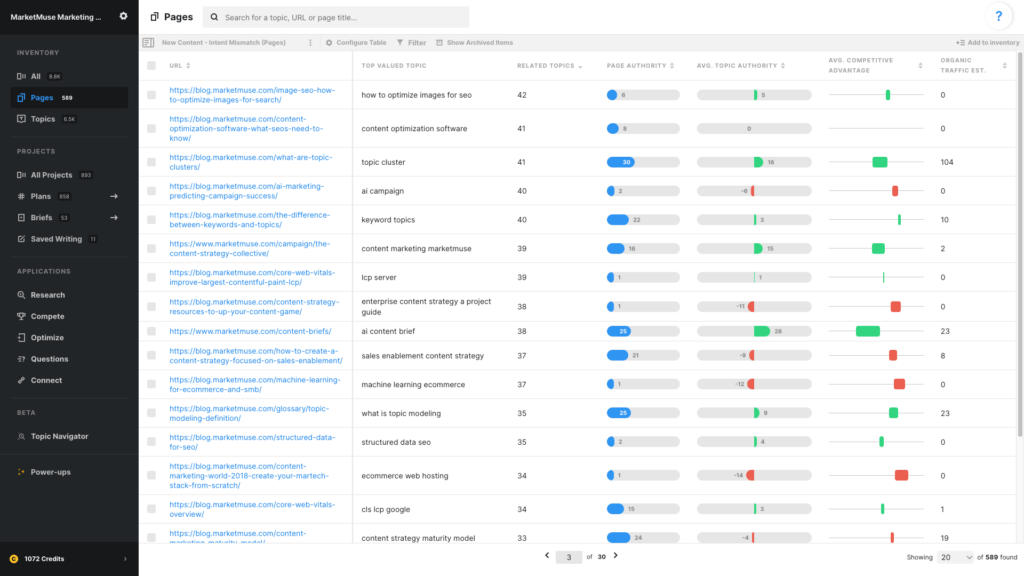
In this article, we are looking at Pages with a possible intent mismatch, looking to answer the question, “What content should I create, based on pages for which we rank but there’s an intent mismatch?”
This is similar to New Content – Intent Mismatch (Content), but instead of directly looking at topics, you’re creating a shortlist of pages. From there, you can examine the pages individually to uncover appropriate topics.
But first, let’s set up a view for this in the Pages Inventory.
Use these data points
- URL
- Top Valued Topic
- Related Topics
- Page Authority
- Avg. Topic Authority
- Avg. Competitive Advantage
- Organic Traffic Est.
URL and Top Valued Topic help to recognize what the page is about.
Related Topics is the number of topics associated with this page, both ranking and non-ranking.
Page Authority is a combined measurement of traffic and ranking and is calculated relative to other pages on your domain. Pages with high Page Authority are those that get a great deal of traffic and rank for many topics.
Avg. Topic Authority averages the topical authority of all the ranking topics for that page. Topic authority is a measurement of how well your site performs for a specific topic.
Avg. Competitive Advantage. Competitive Advantage is a metric that applies to individual topics. At the page level it is averaged since one page can rank for many topics. Competitive Advantage is the difference between Difficulty (how hard it is for anyone to rank for a topic) and Personalized Difficulty (how hard it is for you to rank for a topic). It’s presented as a horizontal candlestick:
- A green bar indicates a positive Competitive Advantage. It’s easier for you because Personalized Difficulty is less than Difficulty.
- A red bar indicates a negative Competitive Advantage. It’s harder for you because Personalized Difficulty is greater than Difficulty.
- The length of the bar illustrates how great your Competitive Advantage is (a long green bar is best).
- Where the bar sits on the line is based on the Difficulty and Personalized Difficulty. The line starts at 0 on the far left and finishes at 100 on the right.
Organic Traffic Estimate is an estimate of the amount of traffic this page currently receives. MarketMuse estimates the traffic for each topic for which a page ranks, taking into account its position in the search results and any SERP features as they impact click-through rates. The results are then summed to create the traffic estimate for the page.
Sort by
Sort on Related Topics highest to lowest (descending).
Using this view
This view can surface strong pages that individually rank for many topics. These pages often rank on the low side for topics where the intent isn’t spot on. Using filters cuts the list down to a more reasonable size after which you can investigate those pages for potential topics.
Customizing this view
Here are a few ideas for customizing this view:
- Apply a filter to Related Topics to limit the list to pages that have a good pool of topics.
- Apply a filter to Page Authority to restrict the list to your strongest pages.
- Consider applying filter to the other metrics to reduce list size, or simply adjust the parameters of the other filters.
